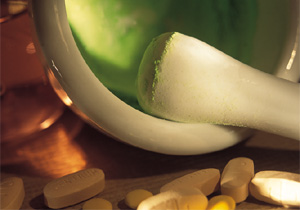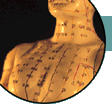Differentiating Syndromes of the Kidney
Kidney yang deficiency syndromes
Chilliness, cold extremities, aching and weakness of the lumbar region and knee joints, impotence, praecox ejaculation, excessive and thin leukorrhea, infertility, profuse and clear urine or enuresis, pale tongue proper with white coating, keep, slow and forceless pulse.
The kidney stores essence which is the original source of reproduction, therefore kidney yang deficiency will influent the genital system and sexual activities. Symptoms seen in men are impotence and praecox ejaculation, and in women excessive and clear leukorrhea, and infertility. The kidney dominates the bones and is the site of primary yang qi convergence. Insufficient yang qi of the kidney fails to warm and nourish the body and extremities, causing chilliness, aching and weakness of the lumbar region and knee joints. The kidney dominates water metabolism, so kidney yang deficiency causes a dysfunction of urinary bladder restriction, manifesting enuresis or profuse and clear urine. A pale tongue proper with white coating and a deep, slow and forceless pulse are signs of yang deficiency.
Kidney yin deficiency syndromes
Dizziness, vertigo, ringing in the ears, deafness, hair loose, loosening teeth, soreness and weakness of the lumbar region and knee joints, insomnia, poor memory, dryness of the throat, night sweating, feverish sensation of palms and soles, low fever, malar flush, red tongue proper, thready, rapid pulse, etc.
Yin deficiency produces internal heat, so symptoms such as low fever, malar flush, feverish sensation of the palms and soles, and night sweating occur. Yin deficiency also leads to insufficiency of body fluid manifested by dryness of the throat. Consumption of kidney yin causes soreness and weakness of the lumbar region and knee joints, hair loss and loosening teeth. Yin deficiency also causes the kidney to fail in its function of producing marrow, and with it filling out the brain. Manifestations are dizziness, vertigo, poor memory and insomnia. Yin deficiency is unable to nourish the upper orifices, and is manifested by ringing in the ears and deafness. Red tongue proper, and thready and rapid pulse are also signs of yin deficiency.
Kidney qi deficiency syndromes
Shortness and weakness of breath, asthmatic breathing aggravated by exertion, perspiration, cold extremities, swelling of the face, pale tongue proper, xu type pulse, etc.
The kidney dominates the reception of qi, so its weakness causes the qi to lose its function of controlling reception. The symptoms of shortness and weakness of breathing result. Asthmatic breathing aggravated by exertion is due to the consumption of qi. The xu condition of the kidney brings on yang deficiency leading to the weakness of wei (defensive) qi, so symptoms of perspiration appear. Cold extremities are due to yang qi failing to reach and warm the four extremities. yang deficiency also has difficulty in promoting qi circulation and water metabolism, so there is swelling of the face. Pale tongue proper and xu pulse are also signs of kidney qi deficiency.
Kidney xu leading to excessive water
General edema with greater severity in the lower extremities, abdominal distention, scanty urine, short breathing, cough and asthma with sputum gurgling in the throat, palpitations, asthma aggravated by exertion, chilliness and cold extremities, flabby tongue body with white coating and deep thready pulse.
The declining of kidney yang causes a dysfunction of the urinary bladder qi activity, manifesting as scanty urination. General edema is due to the water and fluid overflowing into the skin and muscles. Retention of water and fluid in the abdominal cavity gives rise to local distension. Excess water and fluid converts into phlegm, manifesting as cough and asthma with sputum gurgling in the throat. If water and fluid overflow upward they attack the heart and lung causing symptoms of palpitation and shortness of breath. yang deficiency fails to warm and nourish the extremities, so it causes chilliness and cold extremities. Flabby tongue body, white tongue coating, deep and thready pulse are signs of yang deficiency causing an overflow of water and fluid.
Unconsolidated kidney qi syndromes
Frequent and clear urination, incontinence, dribbling of urine, nocturnal enuresis, involuntary seminal discharge without dreams, praecox ejaculation, soreness and weakness of the lumbar region, wan complexion, pale tongue proper with white coating, thready and weak pulse.
The kidney stores essence, if kidney xu fails to consolidate the source of semen involuntary seminal discharge and praecox ejaculation occur. Kidney xu causes the dysfunction of urinary bladder restriction seen in the symptoms of frequent and clear urination, dribbling of urine, incontinence, and nocturnal enuresis. The waist is the house of the kidneys, deficiency causes soreness and weakness of the lumbar region. Wan complexion, pale tongue proper with white coating, and thready weak pulse are signs of yang xu in the kidney.
Syndromes a,c,d, and e are based on the insufficiency of kidney yang. However, each has its own emphasis on pathological changes and clinical manifestations. The non-consolidation of kidney qi mainly indicates syndromes of yang xu of the kidney which causes uncontrollable seminal emissions and the dysfunction of the urinary bladder restriction. Kidney yang xu also leads to an inability to receive qi from the lung. Kidney xu, resulting in the overflow and subsequent retention of water, derives from dysfunction syndromes of the kidney, which normally controls water metabolism and qi activity. The declining of kidney yang also shows the syndromes of hyperactive sexual function.
Related Subjects
Read more on description of the main syndromes of other zang-fu organs:
Heart,
Liver,
Spleen,
Lung,
Small Intestine,
Large Intestine,
Urinary Bladder,
Stomach, and
Gall Bladder.
|

 This website is published, edited and designed by Raymond Cheng,
and reflects only and only his personal views and opinions in his individual capacity.
The information available at this website is not intended
directly or by implication to either diagnose or treat any
medical, emotional, or psychological condition or disorder.
It is also not intended to create a physician-patient relationship
between you and I or between you and Wyith Institute™ and The Office of Dr Raymond K K Cheng.
The information here is not a substitute for advice and treatment provided
by your physician or by another healthcare professional.
It is always recommended that consultation with local healthcare providers
be obtained for any of your specific health or medical concerns.
Furthermore, any products that can be purchased (yet you can see I don't have much
to sell here) through advertisers' banners or through links to other websites
are not either explicitly or implicitly given any warranty or endorsement
by me, my colleagues, Wyith Institute™ or any of its associated businesses.
This website is published, edited and designed by Raymond Cheng,
and reflects only and only his personal views and opinions in his individual capacity.
The information available at this website is not intended
directly or by implication to either diagnose or treat any
medical, emotional, or psychological condition or disorder.
It is also not intended to create a physician-patient relationship
between you and I or between you and Wyith Institute™ and The Office of Dr Raymond K K Cheng.
The information here is not a substitute for advice and treatment provided
by your physician or by another healthcare professional.
It is always recommended that consultation with local healthcare providers
be obtained for any of your specific health or medical concerns.
Furthermore, any products that can be purchased (yet you can see I don't have much
to sell here) through advertisers' banners or through links to other websites
are not either explicitly or implicitly given any warranty or endorsement
by me, my colleagues, Wyith Institute™ or any of its associated businesses.



 Thank you for visiting this TCM and acupuncture information website.
If you have previously been to this website, you might have
noticed that some of the pages on ancient historical ideas and
holistic thinkings related to Chinese metaphysics are temporarily taken offline.
This is because I will be revamping the whole website and be moving
those information into a new \"Ancient Chinese Culture\" section
so as to reflect a more current perspective on the interpretation
of some of the fundamental concepts as well as to include
some of the latest information in the area.
But if you have just found this website for the very first time, I welcome you again and
wish you could find what you require and, hopefully, you could also be benefitted
from reading the articles I published on this website.
Thank you for visiting this TCM and acupuncture information website.
If you have previously been to this website, you might have
noticed that some of the pages on ancient historical ideas and
holistic thinkings related to Chinese metaphysics are temporarily taken offline.
This is because I will be revamping the whole website and be moving
those information into a new \"Ancient Chinese Culture\" section
so as to reflect a more current perspective on the interpretation
of some of the fundamental concepts as well as to include
some of the latest information in the area.
But if you have just found this website for the very first time, I welcome you again and
wish you could find what you require and, hopefully, you could also be benefitted
from reading the articles I published on this website.